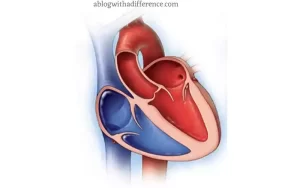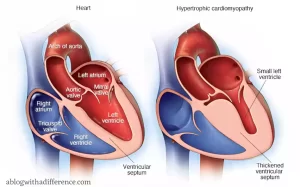Dilated Cardiomyopathy and Hypertrophic Cardiomyopathy are two conditions affecting millions worldwide; in this article we’ll compare their differences, symptoms, risk factors and diagnostic methods.
What is Dilated Cardiomyopathy?
In Cardiomyopathy and Hypertrophic Cardiomyopathy cases, it is possible to observe complications, such as blood clots and arrhythmias.

Dilated cardiomyopathy affects the left ventricle of the heart – its chamber that pumps blood. Under its effects, its muscles dilate, weaken and limit blood flow resulting in decreased flow rates; with time both ventricles may become damaged permanently. Dilated cardiomyopathy typically produces no significant symptoms but remains life-threatening and one of the main causes of cardiac failure, with irregular heartbeats, blood clots, and sudden deaths all possible outcomes.
Diabetes, obesity, hypertension, problems with heart rhythm and organs due to excessive iron accumulation as well as pregnancy complications are the main sources of health complications in modern society. Other contributing factors can include toxic substances exposure or alcohol, drugs such as those used for cancer treatments, or illicit substances like cocaine. This condition may result in fatigue, palpitations of the heart, chest pain, and murmurs in your heart.
Risk factors for it include long-term hypertension as well as family histories of cardiac arrest or failure and associated damage/inflammation to heart muscle cells. Dilated cardiomyopathy, commonly referred to as DCM, can result in heart failure, regurgitation of heart valves, issues with rhythm, cardiac arrest, and blood clotting.
Although DCM cannot be prevented completely, smoking, alcohol abuse, and drug addiction as well as eating low salt diets, managing stress more effectively, sleeping enough hours a night, and rest will all help decrease or avoid its occurrence.
What is Hypertrophic Cardiomyopathy?
Hypertrophic cardiomyopathy occurs when heart muscle thickens abnormally. Hypertrophic cardiomyopathy usually affects the interventricular septum and ventricles of the heart; blood flow may not effectively pump due to electrical problems as well as palpitations and fatigue may ensue; additional symptoms could include shortness of breath, chest pain, leg swelling or fainting resulting from this disorder if undiagnosed.
This disease could even prove life-threatening and cause sudden death if left undetected and undetected until eventually fatality ensues from underdiagnosis as it progresses further than expected!

Similarities Between Dilated Cardiomyopathy and Hypertrophic Cardiomyopathy
- The ventricles are affected by both cardiomyopathies.
- The blood flow to the organs is restricted.
- In both cases, it is possible to observe complications, such as blood clots and arrhythmias.
- They display symptoms like fatigue, exhaustion, shortness in breath, heart pounding, and chest discomfort.
Difference Between Dilated Cardiomyopathy and Hypertrophic Cardiomyopathy
- Differences in structure: DCM has an enlarged, weakened heart while HCM features an abnormally thickened heart muscle.
- Risk factors and causes: DCM can be caused by alcoholism, viral infections, nutritional deficiencies, and pregnancy. HCM, on the other hand, is caused by mutations in genes, abnormalities of certain proteins, and high blood pressure.
- Symptoms: Both conditions include shortness of breath, chest pain, and dizziness. HCM can also lead to fainting and cause dizziness, whereas DCM causes swellings around the ankles and feet as well as irregular heartbeats.
- Diagnostic tests: An echocardiogram is usually used to diagnose both conditions, although other tests can be performed in order to monitor and help diagnose the condition.
- Treatment: Treatments for DCM or HCM include lifestyle modifications, medications that improve the heart’s function, surgery, or implanting a device. The specific treatment may differ depending on the cause and needs of each patient.
Cardiomyopathy, or heart muscle disease, can take two forms. Dilated cardiomyopathy dilates the left ventricle to decrease pumping pressure while hypertrophic causes interventricular septae and ventricles to thicken, contract and restrict circulation thus decreasing pumping pressure further; unexpected heart failure or sudden deaths often arises as a result. These diseases differ considerably when compared with each other and serve as key markers between hypertrophic and dilated Cardiomyopathies.
Conclusion
DCM causes an enlarged, weakened heart often caused by environmental factors like alcoholism or viral infections while HCM involves abnormally thickened heart muscle that often comes about genetically. Shortness of breath, chest pain and leg swelling are the hallmarks of both conditions while they can sometimes also result in dizziness or fainting episodes.
Early diagnosis and treatment of DCM or HCM is key in order to avoid complications, and should you experience symptoms, it’s vital that medical advice be sought immediately. Additional prevention strategies like maintaining healthy weight and blood pressure levels as well as forgoing drugs that damage the heart can also lower risks significantly.
DCM and HCM can both be managed effectively with medical treatments and lifestyle modifications, but untreated cases could prove life-threatening – for this reason, it’s vital for those living with DCM/HCM to receive regular checkups by their cardiologist.